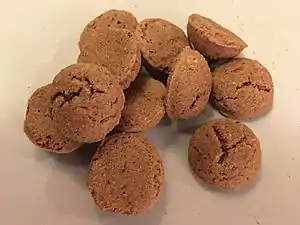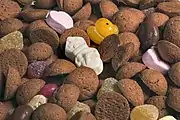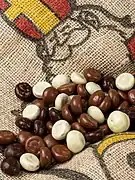Kruidnoten
Kruidnoten (Dutch pronunciation: [ˈkrœytnoːtə(n)] ⓘ) are hard cookie-like confectioneries made of speculaas, roughly the size of a coin and shaped as a flattened hemisphere, traditionally associated with Sinterklaas and consequently commonly eaten in Belgium and the Netherlands.
 kruidnoten | |
| Alternative names | kruidennoten (mistakenly), pepernoten (mistakenly) |
|---|---|
| Type | Biscuit |
| Place of origin | Netherlands |
| Main ingredients | |
| Variations | many (see article) |
| 75 or more kcal | |
Traditions
The Netherlands
When children come to witness Sinterklaas' arrival to the country, it is normal to receive a handful of kruidnoten from one of his helpers called Zwarte Piet. At home, during Sinterklaas eve, kruidnoten and other candies are thrown around. Children consider it a form of entertainment to go around and collect the dropped candies. In earlier days it was habit to throw around kruidnoten on the pavement and at schools during visits of Sinterklaas, too. At a certain moment, maybe because of hygiene concerns, this became less common. At school, visiting Zwarte Piets now tend to lay down a pile or small bag on the student's desk or directly in the child's hand.[1] Although some guess this throwing around has a deeper meaning, comparable to the throwing of rice at weddings it is most likely a symbol of Sinterklaas' generosity. Some schools and supermarkets organize make-them-yourself sessions.[2] [3] Children are given pre-made dough and are tasked to shape them into kruidnoten.
Belgium
Kruidnoten were not consumed by the Flemish for a long time and no traditions exist, but around the late 2010s, interest in them grew.[4] [5] Instead of kruidnoten, Zwarte Piet throws letter-shaped biscuits that come with different names depending on the region, like "karolientjes", "mokskes", "pieknieken", or "nicnacjes".[6]
Variations
In the Netherlands, kruidnoten are one of the most popular and recognizable candies during the Sinterklaas period. During the 21st century the recipe has become the subject of experimentation.[7][8] Pop-up shops, fully devoted to selling the many variants that have been produced over the years, have become a yearly sight in many cities.[9][10] The common grocery and candy store has a selection to choose from as well.[11][12] Besides the regular variant and packages that include gummies and sugar candies kruidnoten can be covered with a layer of (white/milk/pure/truffle) chocolate.[13] Some large retailers such as Albert Heijn and Jamin and producers such as Van Delft provide many types with other flavors. In 2021 they offered:[14][15][16]
- Caramel (usually with sea salt)
- Powdered sugar (additional ingredient to other variants)
- Coconut
- Butterscotch
- Tiramisu
- Crème brûlée
- Stracciatella
- Yogurt
- Stroopwafel
- Tompouce
- Macaroon
- Speculoos (Flemish variant of speculaas; not spicy, softer texture)
- Liquorice
- Salmiak
- Sour rolls (Fruit Roll-Up covered with sour sugar)
- Ginger
- Cinnamon
- Hazelnut
- Pistachio
- Anise
- Peanut butter
- Toffee
- Honey
- Cheese
- Bubblegum
- Cola
- "Rainbow/Unicorn" (sugar coated, with the main appeal being the colorful look of the kruidnoten; a product solely targeted at small children)
- Alcohol;
- Fruit;
- Strawberry
- Blueberry
- Raspberry
- Cranberry
- Orange
- Melon
- Banana
- Passion fruit
- Lemon
- Lime
- Coffee;
- Cake/pie;
Gallery
 Kruidnoten with candies, called "strooigoed"
Kruidnoten with candies, called "strooigoed" Kruidnoten with a layer of chocolate, called "chocoladekruidnoten"
Kruidnoten with a layer of chocolate, called "chocoladekruidnoten"
Trivia
References
- "Article: The story behind "strooigoed" (Sinterklaas candy for throwing)" (in Dutch). Laura's Bakery. 26 November 2017. Retrieved 9 April 2021.
- "Supermarket invitation to come bake kruidnoten (2019)" (in Dutch). In De Buurt Delft. 13 November 2019. Retrieved 9 April 2021.
- "School hosts Sinterklaas event for their students (2020)" (in Dutch). IKC Het Plankier. Retrieved 9 April 2021.
- "Sinterklaas differences between The Netherlands and Belgium" (in Dutch). Marketing Concurrent. Archived from the original on 11 April 2021. Retrieved 11 April 2021.
- "Article: Pepernoten factory opens first store in Belgium" (in Dutch). PZC. Retrieved 11 April 2021.
- "Sinterklaas brings delicious mokskes" (in Dutch and Flemish). Schrijf.be. Retrieved 11 April 2021.
- "Top 5 most eaten Sinterklaas sweets" (in Dutch). Droptelegram. Retrieved 9 April 2021.
- "Article: What's the most popular kruidnoot?" (in Dutch). Nu. 29 November 2018. Retrieved 9 April 2021.
- "Blog: Pepernoten stores and pepernoten pop-up stores with the best kruidnoten" (in Dutch). Follow My Footprints. 30 November 2020. Retrieved 9 April 2021.
- "Local news report: Kruidnoten pop-up store coming to Enschede" (in Dutch). 1Twente Enschede. Archived from the original on 2021-12-20. Retrieved 9 April 2021.
- "Complete product line available at Albert Heijn grocery store" (in Dutch). Albert Heijn. Archived from the original on 2020-12-01. Retrieved 9 April 2021.
- "Complete product line available at Jamin candy store" (in Dutch). Jamin. Archived from the original on 2020-12-02. Retrieved 9 April 2021.
- which is one of the earliest and most loved variants
- "Complete product line available at the Van Delft factory" (in Dutch). vandelftchocolates.nl. Archived from the original on 12 May 2021. Retrieved 9 April 2021.
- "Complete product line available at Albert Heijn grocery store" (in Dutch). Albert Heijn. Archived from the original on 2020-12-01. Retrieved 9 April 2021.
- "Complete product line available at Jamin candy store" (in Dutch). Jamin. Archived from the original on 2020-12-02. Retrieved 9 April 2021.
- Bolletje
- "Kruidnoten flavor contest, hosted by Bolletje" (in Dutch). Qmusic. Archived from the original on 2021-04-09. Retrieved 9 April 2021.
- "Kruidnoten flavor contest, hosted by 24Kitchen" (in Dutch). AD. Retrieved 9 April 2021.
- "Article: What's the difference between pepernoten and kruidnoten?" (in Dutch). Onze Taal. Retrieved 19 November 2011.
- "Forum conversation: "Why are kruidnoten being called pepernoten these days?"" (in Dutch). Startpagina/GoeieVraag!. Archived from the original on 27 October 2016. Retrieved 19 November 2011.
- "The "pepernoten" category page at the Bol online store" (in Dutch). Bol. Retrieved 9 April 2021.
External links
 Media related to Kruidnoten at Wikimedia Commons
Media related to Kruidnoten at Wikimedia Commons